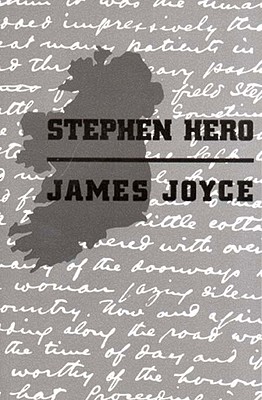APS TOGETHER
Day 9
Stephen Hero by James JoyceXXIII, pp. 164-180
January 20, 2022 by Belinda McKeon
This chapter opens with the wrenching description of Isabel’s death. What’s striking about the structure of the scene is the bluntness, the plainness with which it begins—“Stephen was present in the room when his sister died”—before it sweeps back, almost in spite of itself, to a much fuller, more emotionally charged account of the child’s last hours and of the effect on the family members who were with her. As it turns out, Stephen was not just “present in the room,” but intensely present, holding his sister’s hand, watching her face change to that of an older woman, watching the death rattles shake her bosom. What Stephen sinks into after Isabel’s death is an angry kind of grief, briskly rational but striking for how much denial and dismissal are woven into it, for how utterly he refuses to consider that his sister was anything like her own person, that she existed. Is it pain which pushes him to diminish Isabel’s personhood in this way? Or arrogance? Or is it kin with the misogyny we see him express later in the chapter, when he refers to women as “marsupials”? It’s a description which manages to be both ridiculous (women as kangaroos, bounding around the streets of Dublin?) and savage (marsupials are born incompletely developed, which seems close to how he sees his sister, who had “not been anything herself”), and Stanislaus Joyce’s diary shows us that Joyce himself had some similar takes on the women he watched in the streets at this time in his life (“dirty animals,” “warm, soft-skinned animals”). Does he mourn his sister, or does he mourn the closeness to the “bitter clay of the graveyard” which her death has forced upon him?ı
Late in the chapter, Stephen (walking the “sluttish streets” of autumnal Dublin) discovers Marsh’s Library, the time capsule of a 1707 reading room which is still to be found in the shadow of St Patrick’s Cathedral, just as Stephen found it. He reads Franciscan texts here, which eventually leads him to attend the Capuchin (Franciscan) church nearby, and he reads, too, “an unpublished book containing two stories by W.B. Yeats,” one of which (“The Tables of the Law”) becomes something of an obsession for Stephen. What does he see in it—or rather, what does he see in the figure of the “monk-errant,” in the characters of Owen Aherne and Michael Robartes, that he wants to take for his own? A bonum arduum (arduous good), he tells Cranly, as distinct from the bonum simpliciter (simple or simple-minded good) sought by ordinary men, men like publicans and judges and librarians. Perhaps it’s simple-minded in itself to come back again to Isabel’s death, but it’s hard not to suspect the experience of watching her waste, die and be buried inspired this determination towards “extravagance” just as much as has any of his reading in Dante, Yeats or Aquinas. That death scene etches itself deep into the reader’s mind.
